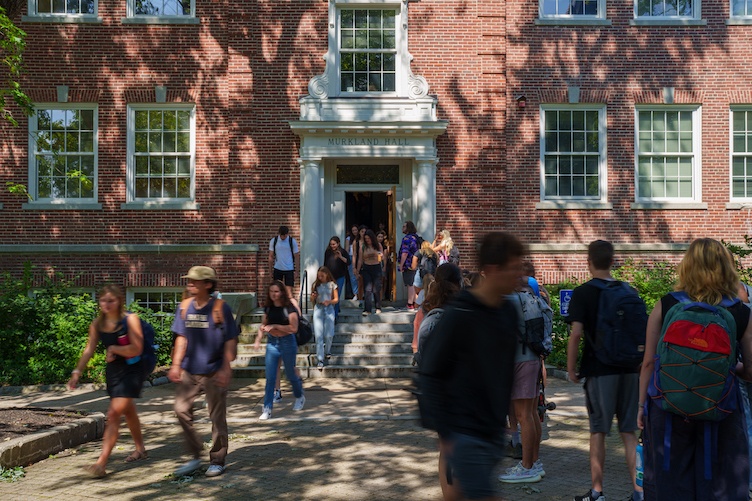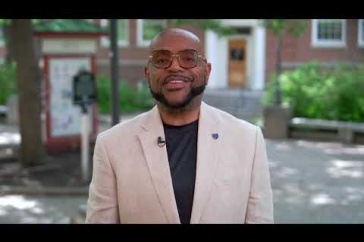
Ranae Reardon ’24 doesn’t need to read any fancy reports to tell her that student mental health is a significant challenge on college campuses.
Those reports certainly exist, and they’re fairly convincing – according to one Healthy Minds Study cited by the American Psychological Association, more than 60% of college students met the criteria for at least one mental health problem during the 2020-2021 school year, and in another national survey, nearly three-out-of-four students reported moderate or severe psychological distress.
But Reardon has all the evidence she needs right in front of her.
“As a student, I have seen my peers struggling,” Reardon says. “This is an extremely stressful time in our lives, and having adequate support for mental health is essential.”
UNH has heard those signals loud and clear – and is taking action. In response to the sharp rise in demand for student mental health services in recent years, Psychological and Counseling Services (PACS) has unveiled a number of new initiatives designed to help students gain access to the care they need more quickly and to have that support better personalized to meet their individual needs.
Starting this semester, students can establish non-urgent care with a PACS therapist via initial phone consultation, significantly shortening wait times to speak to a counselor. PACS has also expanded its Peer Ambassador Program to offer peer support on a drop-in basis, giving students who want someone to talk to the option of connecting directly with a fellow student.
Though the initiatives are only weeks old, the impact is already tangible. Elisa Bolton, director of PACS, says students can often schedule a phone consultation within three to five business days – a significant improvement over wait times as long as three weeks in some instances prior to the changes.
“We’ve really worked to be responsive to student concerns,” Bolton says. “Through these changes we’ve been able to be in contact with twice the number of students as before in the same period of time.”
"We’ve really worked to be responsive to student concerns. Through these changes we’ve been able to be in contact with twice the number of students as before in the same period of time."
Adds Reardon, who serves as the Health and Wellness council chair on the student senate: “I have already heard from multiple students that they are impressed with how quickly they were able to schedule an appointment.”
The initial phone consultations are not counseling sessions, but rather an opportunity for students to share concerns with a therapist, who can determine each student’s needs and help provide a personalized care plan and prioritize next steps.
Another benefit of early intervention through phone consultations, Bolton says, is that students who might ultimately need services outside of counseling can more quickly be redirected to the appropriate source – students who may be battling hunger or are unsure of how they are going to pay rent, for instance.
As for the expanded peer ambassador program, students can drop-in to the PACS office Monday through Thursday between 3 p.m. and 5 p.m. and speak with a student offering peer support. The peer ambassadors underwent a two-day training session prior to the program to understand the best ways to respond to student needs and to know when it might be necessary to refer students to other resources for help.
“Sometimes students really want to talk to someone who has recently gone through the same things they have, like a breakup or a disagreement with a parent or roommate, where they just kind of need someone to hear them and remind them how much they matter,” Bolton says.
Additionally, the expanded peer support program may provide a way to combat the apprehension students can sometimes feel about seeking mental health support.
“For many students, it can be really intimidating calling PACS and going there alone,” says Ande Allison ’24, former mental health chair of the Student Athletic Advisory Committee and active mental health advocate on campus. “A stigma around asking for help when it comes to mental health concerns still exists. I think that having peer support will provide a less intimidating way for students to ask for help and can work to provide a bridge to taking the next step and talking to a mental health professional.”
In addition to the many other health promotion efforts and health coaching services that the staff at Health & Wellness offer, they have also recently introduced self-assessment tools like the Well-being Wheel and collaborated with PACS on the “How are you – really?” initiative, which encourages honest discussion and use of campus resources and proven strategies.
The wheel breaks wellness into eight categories and includes descriptions of what optimum wellness in each might look like, while the “How are you – really?” tool is designed to encourage students to answer the question, “how are you?” thoughtfully and honestly, rather than just providing the rote “good” in response. It is designed to encourage students to more openly check in with themselves and each other and to help each other find the appropriate support if necessary.
“This prioritization would not happen without the advocacy and voices of students. I am so glad that our administrators, deans, professors and everyone else in leadership positions are listening to what the students are pushing and fighting for.”
All of these changes are designed to improve student mental health, but they are also notably student-driven – something Allison is proud of.
“This prioritization would not happen without the advocacy and voices of students,” Allison says. “I am so glad that our administrators, deans, professors and everyone else in leadership positions are listening to what the students are pushing and fighting for.”
The biggest hurdle remains simply spreading the word about these offerings to the full student body. Both Reardon and Allison expressed appreciation as students for the fact that mental health is a priority focus at the university level, but both also noted that the majority of students could still be better informed about what is available to them.
“In my opinion students are becoming more aware that these support options exist but it is still relatively unknown,” Reardon says. “PACS provides so much more than just individual counseling and I really hope students who need help know that they are here.”
While outreach remains a challenge and student mental health is a critical issue nationwide, Bolton believes the steps taken at UNH reflect a university-wide commitment to addressing those problems and positioning the university as a leader in listening to students and creating an environment where everyone can flourish.
“I honestly believe we are fairly cutting-edge on this. It’s not just reactive; all the way up to upper administration there’s a general commitment here that everybody demonstrates their investment in students, that when student mental health and emotional well-being are attended to, that’s when students thrive,” Bolton says. “Sometimes people feel like they have to go it alone, but they don’t. There are a ton of professionals on campus to help you at that point of crisis and get the support you need to create what you want for yourself at UNH.”
Students in need of support are encouraged to contact PACS. PACS provides emergency services 24 hours per day, seven days a week by calling 603-862-2090 (Relay NH: 1-800-735-2964). For non-urgent matters PACS can also be contacted via email at pacs@unh.edu or students can visit the office on the third floor of Smith Hall at 3 Garrison Ave.
-
Written By:
Keith Testa | UNH Marketing | keith.testa@unh.edu

















































